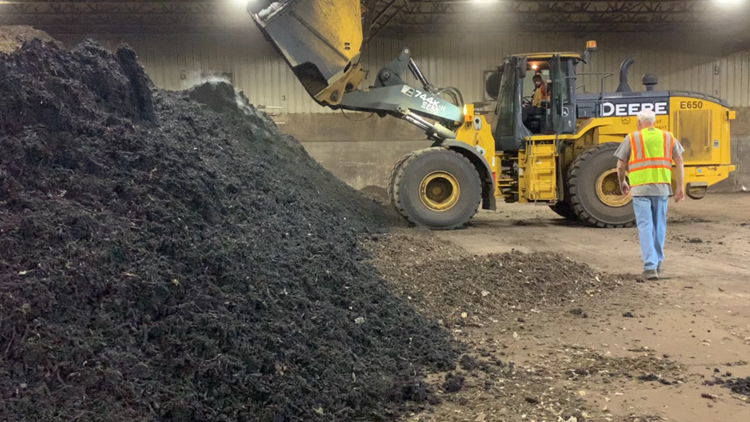DAVENPORT, Iowa — When Scott County residents put their yard waste out at the curb, what exactly happens once it's collected? After a more-than-50-day process at the Davenport Compost Facility, it becomes nutrient-rich compost, mulch, soil and other products fit for any lawn and garden endeavor.
Each year through its collection of biosolids* and yard waste, the facility is able to:
- Divert over 1 million pounds of waste from the landfill
- Produce more than 30,000 cubic yards of compost
- Sell about 18,000 bags of its own product
"This is the only facility like this in the state of Iowa," Waste Commission of Scott County Executive Director Kathy Morris said. "There aren't that many in the U.S., and it is so well-run. I don't know if our residents and businesses realize how much this has helped us in our integrated waste management system."
When the Aug. 2020 derecho barreled through the Quad Cities area, it was the compost facility that stepped up. The windstorm, according to a report from the Iowa Department of Natural Resources, destroyed or damaged an estimated 4.5 million Iowa trees.
"(The Davenport Compost Facility) had a line the very next morning that extended down the street," Davenport Compost Facility Compost Supervisor Pat Linehan said. "We had to change the way we accepted drop-offs to get people moving through here as quickly as we could."
Grinders were set up at different parks and public locations all around Scott County to process the mass tree debris, and the mulch byproduct was sold or given to landscaping companies in the area.
The state-of-the-art Davenport facility, throughout its 26 years in operation, produces yard products from material that would otherwise sit in the landfill.
COMPOST PROCESS EXPLAINED
From start to finish, the compost process takes 51 days and undergoes strict quality standards at the Davenport facility.
1. Collecting: The compost process begins with yard waste and bio-soil** collection. This happens either curbside or at the compost facility's yard waste drop-off and green waste recycling center for Scott County residents and businesses.
2. Reducing: Yard waste collected is reduced using a grinder. That material is passed through a 6-inch screen and then a 3-inch grinder.
3. Pre-mixing: New waste along with waste that does not pass the later curing stage are combined in a mix ratio that supports ideal composting conditions.
4. Mixing: The pre-mix of yard waste is combined with Water Pollution Control Plant biosolids that have been pressed to remove about 20% of wastewater - resulting in a puddling-like consistency.
5. Testing: The yard waste and biosolids mixture is tested in a lab six times a day to measure moisture levels and organic content, as moisture is essential to the compost process.
6. Decomposing: Mixed material is placed in one of 24 blower bays for 21 days. During this time, air flow is monitored and adjusted using software that ensures optimum decomposition conditions. High temperatures destroy weed seeds and disease-causing organisms from living in the compost.
7. Curing: After 21 days, the material is screened and moved to the to the curing area for an additional 30 days of processing.
8. Screening: After curing, the material goes through additional quality screening. The material that does not pass the screening is sent back to the pre-mixing step to be combined with new waste.
9. Bagging: The material that passes through the screening moves out to on-site storage or the bagging area, where the compost is packaged to be sold.
TOUR THE FACILITY
The compost facility, located at 2707 Railroad St. in Davenport, will host an open house from 10 a.m. to 2 p.m. Saturday, Oct. 2. The free event allows the public to take a self-guided tour of the operation, explore the yard products offered and speak with members of the Iowa State University Master Gardener Program about how to improve their own garden or lawn.
Attendees will receive a pair of garden gloves while supplies last.
WANT TO DROP-OFF YARD WASTE?
The compost facility is open for drop-offs from Scott County residents 7:30 a.m. - 5:30 p.m. weekdays and 8 a.m. - 3 p.m. weekends through November. Beginning Dec. 1, the facility will be open 8 a.m. - 3 p.m. weekdays and closed on weekends.
Learn more about guidelines for drop-off, including what materials are accepted, click here.
*Biosolids, according to the Environmental Protection Agency, are a product of the wastewater treatment process. During wastewater treatment, liquids are separated from solids, and the solids are treated physically and chemically to produce the nutrient-rich biosolids.
**Bio-soil is nutrient-dense soil that, according to Green Living Technologies International, contains a large variety of beneficial bacteria that are able to convert nitrogen from the air into a natural fertilizer.
Learn more about Davenport's 2020 derecho cleanup here:



